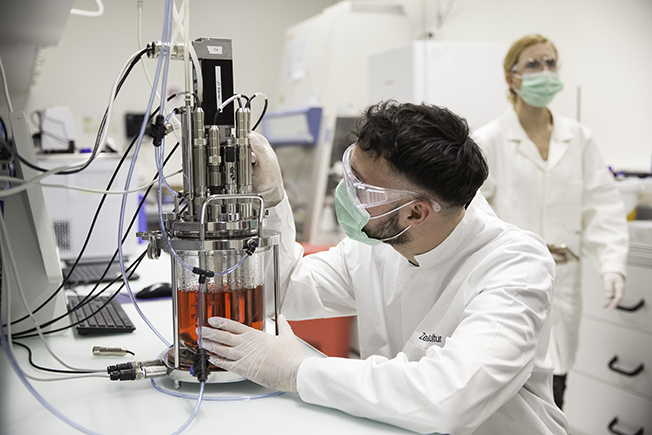

Leading the charge in advancing plant proteins for a sustainable future
Ingredion is driving plant protein innovation, with Akshay Arora and Daniel Kennedy spearheading efforts to improve performance, taste, and affordability. Here we find out how their work is shaping the future of sustainable, plant-based foods for a growing global market
Plant proteins have moved beyond mere trend status – they’ve become an essential part of the global food industry. As we face the realities of population growth, sustainability challenges, and shifting consumer preferences, the rise of alternative proteins is transforming the way we think about food. The plant-based revolution is not just about offering substitutes for meat; it’s about creating sustainable, nutritious options that will define the future of eating. At the heart of this transformation are companies such as Ingredion, which is at the forefront of making plant proteins more accessible, functional, and flavorful.

A new era of eating
“There’s a strong belief in the ingredients industry that plant proteins are here to stay, and for good reason,” says Akshay Arora, Director Innovation, Protein Fortification at Ingredion. “As global economies improve, there will undoubtedly be a growing demand for animal-based proteins. But the reality is that the Earth can only sustain so much meat production. To achieve balanced, high-quality protein availability worldwide, it’s essential that we create viable alternatives.
“At Ingredion, we’re committed to the long-term growth of plant proteins,” Arora adds. “However, to take this movement to the next level, we need to keep pushing forward on three fronts: improving performance, enhancing taste, and ensuring affordability. There’s a lot of potential in this space, and we’re just scratching the surface.”
Central to the movement is sustainability. As consumers become increasingly aware of the environmental impact of their dietary choices, plant-based alternatives are positioned to bridge the gap between nourishing people and protecting the planet. So, with the global food industry searching for solutions, Ingredion is leveraging its expertise to make plant proteins more accessible and scalable across markets globally.
One big driver of plant protein innovation has been the rising consumer demand for healthier snacking and on-the-go products. As people continue to lead busy lives and search for convenient, nutritious options, plant-based snacks, protein bars, and ready-to-drink beverages have gained immense popularity. “The rise in snacking and portable nutrition has been a huge factor in the growth of plant proteins,” suggests Daniel Kennedy, Director, Platform & Business Development of Plant Based Protein for Ingredion in the USA and Canada. “Consumers are looking for products that not only taste great but also fit their active lifestyles, and we see a lot of potential in this category.”
We believe plant proteins are here to stay, and we’re committed to making them better in every way – performance, taste, affordability, and sustainability
Collaborate to unlock innovation
It’s important to stress that the future of plant proteins won’t be shaped by single companies alone – it requires an ecosystem of collaboration. “We’ve partnered with organizations such as MISTA and the Plant Protein Innovation Center at the University of Minnesota as we understand that no one can achieve these long-term goals in isolation,” Kennedy adds.

Partnerships actually play a key role in driving innovation forward. Ingredient suppliers, manufacturers, researchers, and retailers are working together to transform scientific advances into real-world applications. Ingredion’s role has been pivotal in developing new ways to refine the texture and flavor of plant-based products, making them more appealing to consumers and easier for manufacturers to integrate into everyday products.
A key strategy for the company and its partners has been focus – tackling the big challenges in manageable phases. “It’s important to take on meaningful problems without trying to do too much at once,” Kennedy feels. “Two years ago, the plant-based industry grew rapidly, but the performance wasn’t always there. Now, we’re stepping back and asking, ‘Where can we make an impact today, while still keeping an eye on long-term goals?’”
Such an approach is vital as Ingredion recognizes that a single bad experience can create a ripple effect of negative consumer feedback. “It’s critical to deliver consistent, positive experiences, even if we start small. Meanwhile, we’re working with our partners to drive the big innovations that will take plant proteins to the next level.”
From ‘Boomers’ to Gen Z
One of the most intriguing aspects of the plant-based revolution is the way younger generations are shaping the market. As Baby Boomers and Gen X pass the torch to Millennials and Gen Z, the consumer landscape is undergoing a dramatic shift. These younger consumers reportedly care deeply about sustainability, animal welfare, and health, and they’re demanding more from their food choices.
“In three to four years, Millennials and Gen Z will hold the majority of the purchasing power,” suggests Kennedy. “They’re more open to new food innovations, and their acceptance of plant-based products is shaping the future of the industry.”
In response to this shift, some industry players are leaning into blending – combining plant proteins with other ingredients such as animal proteins or algae-based proteins to create products that balance taste, texture, nutrition, and affordability. “Blending is already common. For example, many meat products, like meatballs, already contain soy protein,” Kennedy notes. “We see this trend growing as consumers demand better functionality and affordability in the post-food inflation world.”
By focusing on blending and the versatility of plant proteins, Ingredion is helping to create products that meet the evolving demands of consumers while staying rooted in sustainability and nutrition.
Innovation at the farm level
Although much of the innovation in plant proteins is happening in manufacturing, there’s a deeper shift occurring upstream. “We’re seeing more innovation happening all the way at the farm level,” continues Arora. “Many of the alternative proteins we see today are relatively new – some are only 15 to 20 years old. With scientific advancements in farming and breeding, we’ll be able to enhance functionality or increase the benefits of crops from the outset.”

This upstream innovation involves developing crops that require fewer chemical interventions during processing. By breeding plants with fewer anti-nutritional factors or higher protein content, the plant protein industry can avoid the need for complex chemical modifications that have traditionally been necessary.
As well as breeding advancements, Ingredion is leveraging new tools in biology and biotechnology to gain a deeper understanding of protein mixtures, structure, and behavior. “By ‘fingerprinting’ plant proteins more accurately, we can design better processes for recovering them. This allows us to create products that are more functional and that taste better,” says Arora.
Ingredion is also laser-focused on simplifying the manufacturing process to ensure that plant-based products can meet consumer demands for clean labels while maintaining high performance. Hydrolyzing proteins, for instance, has long been a standard approach for enhancing functionality, but it often introduces negative flavors. Ingredion has taken a different approach.
“When we developed our bar isolate, we asked ourselves, ‘Can we achieve the same functionality without hydrolyzing?’ This way, we could offer a cleaner label and simplify the production process,” Kennedy explains.
So, what was the result? A more straightforward, scalable solution that maintains the desired performance without compromising taste or adding extra costs. Ingredion’s expertise in simplifying processes has led to improvements in both taste and affordability, bringing plant proteins closer to mainstream adoption.
The challenge of texture
One of the most important challenges in plant-based product development is texture – a critical factor that can make or break a consumer’s experience. “Texture can be even more important than flavor when it comes to product acceptance,” Arora believes. “For example, dairy alternatives need to mimic the smooth, creamy texture consumers expect from traditional dairy.”
Ingredion has tackled this by focusing on solubility and protein interactions in beverages and cold- pressed applications. “In dry-blended beverages, a common issue is grittiness or sedimentation after a few minutes,” Arora adds. “We’ve addressed this by manipulating the solubility of proteins, significantly reducing these texture defects.”

them ideal for protein shakes
Meanwhile, in meat alternatives, the focus has been on replicating juiciness – an element often missing in plant-based meats. “Through our research with Wageningen University in the Netherlands, we discovered that water-holding capacity is crucial for achieving the juiciness consumers expect. By manipulating this factor in fava protein, we’ve significantly improved the texture of alternative burgers,” Arora reports.
By combining innovative solutions with collaboration across the value chain, Ingredion is accelerating the growth and widespread adoption of plant-based foods. “We believe plant proteins are here to stay, and we’re committed to making them better in every way – performance, taste, affordability, and sustainability,” Arora concludes.
From the farm to the table, the future of plant proteins is bright, and Ingredion is leading the way in ensuring that this future is one where everyone can benefit – from the consumer to the planet.
For more information visit www.ingredion.com
If you have any questions or would like to get in touch with us, please email info@futureofproteinproduction.com


%20ILVO%202.jpg)

.png)

